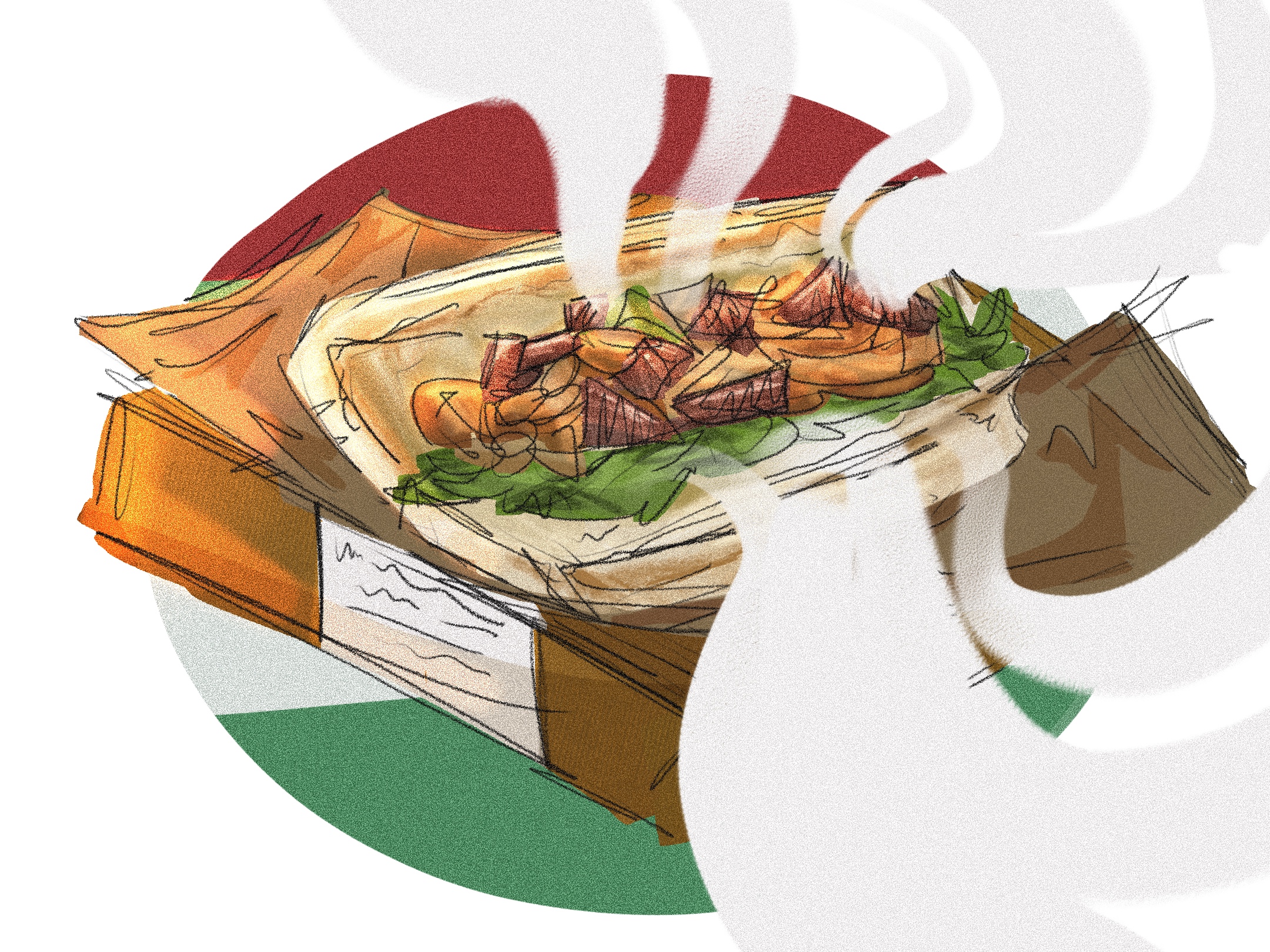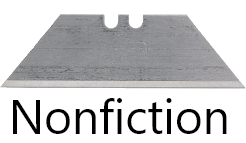The Food Truck

art by Willow Street
My father was a cranky Hungarian. When my mother was annoyed with him, she’d grumble about “stubborn red-headed Hungarians” and balk at accompanying him on his Saturday visits to his mother and sisters, because they argued and chattered like “a bunch of Zsa-Zsa Gabor clones.” They did. My father, the baby, was born in America, but his sisters were born in Hungary and forever retained both the cadence of their first language and their red hair (first naturally and then with the help of science).
“This week I’ll stay home and listen to the opera,” my mother would say, kicking off her shoes and lying down on the sofa. “When I’m retired and not so tired by the weekend, I’ll actually go to the opera. Why else did I major in music and become a music teacher? Take Lizzie with you to your mother’s house and have a good time. Don’t eat too much heavy food or you’ll be up all night with indigestion, like last time.”
I knew that by the time my father and I returned home, stuffed to the gills with goulash, chicken paprikas, weiner schnitzel, palacsinta, pogacsa, aranygaluska, fank, strudel, nut torte, and the occasional plate of halusky (a nod to a Slovak neighbor who sometimes stopped by), my mother would be in a better mood from listening to opera music. She would hug my father and me, and the three of us would sit down to a healthy dinner at our small white table and three red chairs. My father never mentioned how much food we ate at my grandmother’s apartment when my mother wasn’t there, so I didn’t either. I knew he wasn’t supposed to eat too much fat or salt or sugar. He and I chewed our salads and vegetables carefully, trying to find room in our stomachs for large, crunchy items while my mother hummed music from the opera and conducted with her fork. The main course was something like mac and cheese that went down easily enough.
My mother kept my father on the straight and narrow, dietarily speaking, through years of high blood pressure and high cholesterol, plus a couple of “minor” heart attacks, until he reached and survived his first quadruple bypass in 1986, the day the Challenger exploded. He was sixty-six years old. After that, his cardiologist told him to lose more weight and to eat even more carefully.
“What’s left to eat?” he asked. When he was seventy-six, he had his second bypass. By then my grandmother was dead, and the only aunt left had her own health problems and wasn’t doing much cooking or baking. All three of us went to her house for one last Thanksgiving dinner, and my father and aunt ate turkey breast without the skin and reminisced about food they wanted while moving their forks over food they didn’t want.
After my aunt died, there was no one to cook Hungarian food. “Too much butter and sour cream,” my mother said. I tried making a few dishes using the recipes my father had coaxed his mother and sisters into writing down, but the larger problem was that my grandmother and aunts had tampered with every recipe they gave him. How could a coffee cake have six tablespoons of baking powder and “sugar to taste”? Was it possible that fank were fried for 30 minutes? Did twenty-four pogacsa contain three cups of sour cream? I cross-checked the recipes against Hungarian cookbooks and corrected what I could, and usually what I made, until I moved a couple of hours away, turned out well enough to let my father and me remember the Saturday meals.
My mother wasn’t cooking much of anything as my father and she got old. Breakfast was cornflakes; lunch was whatever the nearby senior center served; dinner was a baked potato with some cottage cheese or yogurt and a salad. Sometimes they skipped the potato and ate the salad on whole-wheat toast. Once a week my mother would bake a very dry honey cake, using only two tablespoons of oil. I liked it, but my father didn’t.
“He eats his cornflakes with a little spoon,” my mother confided over the phone. “It takes him forever!” I listened as I slapped together lunches for my husband and my children. My mother had eaten carefully all her life, but I know my father missed Hungarian food. Whenever I flew east to visit my parents, I brought samples.
“Not bad,” my father said.
“How much butter did you put in this cake?” my mother asked.
Every visit, I’d slip miniscule samples to my father when my mother was in the kitchen, chopping carrots or counting out his medications.
“Eat it now. Don’t tell Mom.” We were two adults whispering like children and glancing over our shoulders.
“I wouldn’t dream of telling her,” he said, chewing quickly. “This is good. It brings back memories. Remember visiting your grandmother and aunts?”
“Of course I do. That’s why I’m working my way through the Hungarian food list,” I said. “The nut torte is too complicated, and so is the strudel, but I’ll try everything else. It would have helped to have real recipes to work from, you know?”
My father laughed. “Your grandmother never wanted anyone to have real recipes. That way she could be the one making the best food. It’s a deal.” I kissed what was left of his hair that used to be red.
I made everything I set out to make for my father except langos. I never got around to it. My grandmother’s recipe for the fried bread was particularly unhelpful, and whatever I found online one day contradicted what I found the day before or the day after. I put the idea of langos aside and kept making the other things, thinking I had all the time in the world.
Now both my parents are gone, and I’m the old parent with health problems. I don’t bake as much as I used to, and I drool over restaurant reviews and cookbooks instead of over food. I dream about my mother often, which is what happens when a person is an orphan and a senior citizen. In my dreams she and I are listening to the opera, or we are at the opera and she is performing an aria, or I am on my way to her apartment and she is waiting on the bench in front of the building, handbag on lap, for me to take her to the opera. I never dream about my father, no matter what I cook or eat. I want to dream about him too. But then I read about the food truck that wrapped langos around meat and cheese, fried the whole thing, and called it a langos sandwich. I thought it was an excellent idea, and I was sorry my relatives had not thought of it.
The review said the truck traveled around midtown on Tuesdays or Wednesdays between the hours of noon and 2 pm on a rotating schedule known only to its owners and possibly to whatever city department licenses food trucks. I imagined it painted exuberantly in the colors of the Hungarian flag, prancing through the streets as people danced after it, although most likely it was stainless steel and slow moving. The reviewer waxed ecstatic about the spaetzle and the cucumber salad and especially the sandwiches:
“Fillings change each week, but the fried bread remains the same, and it’s perfection!”
“I’m finding this truck and eating a sandwich, Dad,” I thought. “Then maybe I’ll have one dream about you and we can both rest in peace with heartburn.”
By the time I could go into the city on both a Tuesday and a Wednesday, the truck was nowhere to be found. There was no website to check and no number to call.
“Maybe call the city department that licenses food trucks?” suggested my husband.
“It won’t work,” I said. “What would I ask? Food trucks are like pigeons. They come and go.” I read the review over and over, trying to taste the sandwiches in the description. I made langos myself, for the first time, and it was pretty good, but maybe it wasn’t right. Maybe what I made was just regular fried bread. The food truck hovered at the corner of my vision, like a retinal sparkle.
“If you’re seeing floaters and flashers, you need to call the eye doctor,” my husband said.
“It’s not like that,” I told him. “It’s all in my head. Or maybe my stomach and my head.”
And that was that, or so I thought, until sometime during the pandemic, when our local paper reviewed a restaurant with outside dining and curbside service, noting that the owners used to own a food truck in the city.
“They make an interesting sandwich using a type of fried Hungarian bread called langos,” the review explained.
“Get up,” I said to my husband. “We’re eating dinner out and outside tonight. I think this new restaurant is owned by the people who owned the food truck. Let’s go.”
“It’s March and windy,” my husband said.’
“Bundle up.”
And so we went. I’m sure the owners (a middle-aged couple who were also the waiters and the cooks) thought I was completely crazed when I started babbling about my Hungarian grandmother’s cooking and asking if they really were the food truck people from the city.
“Yes, that was us,” said the wife. “We had the food truck for a while, but the city got too expensive, and we had kids and needed more space, and we decided to move out here and open a restaurant instead. So, are you going to eat outside or take out? The menu is up on that blackboard.”
I didn’t even have to peer inside. “We want two of the original langos sandwich from the food truck to eat here, please,” I blurted out.
“Very good,” she said. “Take any seat you want.”
We sat down at a table in the front courtyard and unrolled our napkins, which promptly blew away. We took out new napkins and put our water glasses on them. I looked toward the restaurant and saw a woman about my age, her face a complicated mixture of nostalgia and anticipation, looking at me.
“Look over there,” I murmured to my husband. “That woman looks sort of Hungarian, don’t you think? And she has a mask the same color as mine.”
My husband looked over and laughed.
“That’s a reflection. That woman is you.”
I looked again. It was me, hands folded on my table, waiting for my sandwich.
“So it is,” I said. “It’s me. I finally made it to the langos sandwich.” I smiled and waved, and my reflection smiled and waved back. If I squinted, I could see my father, my aunts, and my grandmother, squeezed around the table reaching for plates of food. I waved to them, too. Then my sandwich came, and I pulled down my mask to take a bite.


